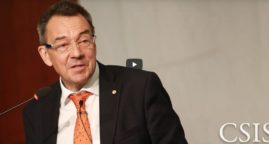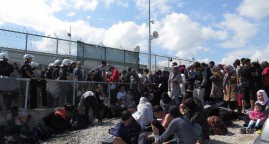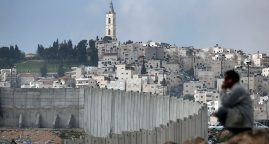ICRC president called on world leaders to address root causes of refugee movements
The president of the International Committee of the Red Cross (ICRC), Peter Maurer, called on world leaders to take stronger action to address the root causes of large movements of people whilst, at the same time, showing humanity and respect for the millions who are on the move.
Mr Maurer said that it is too often violence that leads to the massive displacement of people.
The president of the ICRC made his comments at the United Nations General Assembly high-level meeting to address large movements of refugees and migrants, in New York. The summit meeting, attended by heads of State and government, aims to develop a blueprint for how to deal with the major migration challenges facing the world.
“It is people’s vulnerability to violence that leads them to flee. The brutal reality of warfare combined with repeated violations of international humanitarian law create unacceptable living conditions,” Mr Maurer says. “Indiscriminate attacks, targeted attacks on civilian infrastructure and on hospitals, siege warfare depriving the population of the means to survive, continue to occur in too many theatres of conflict around the world”
The ICRC president underlined that, beyond the large movements of people, it is the fate of individual human beings that is at stake, and that each and every one of the 65 million people displaced around the world “deserve fair and humane treatment”.
Mr Maurer also reminded States of their global responsibilities. “I call on you to respect the law, to ensure respect for the law, to keep the balance in a world where many different powers pull in all different directions. Lawlessness produces refugees and will never permit safe return.”
“Bad policies will create additional suffering. Therefore, steer clear of arbitrary detention and inadequate fast-track procedures. Do not allow inhumane conditions and family separations.”
The ICRC president also attended the Leaders’ Summit on the Global Refugee Crisis hosted by US President Barack Obama on the margins of the UN General Assembly (UNGA) on 20 September. He went on to participate in the high-level week of the UNGA from 20 to 26 September to help ensure that the voices of the victims are heard and to remind States of their obligations under international humanitarian law.
With 15,000 staff on the ground in over 80 countries, the ICRC’s work spans migrants’ countries of origin, transit and reception. For many years now, the organization has assisted millions of vulnerable refugees and internally displaced people, particularly in Africa and the Middle East, with food, water and sanitation, and access to primary health care. During the first half of 2016, and in close collaboration with National Red Cross societies in the region, it has provided humanitarian assistance to thousands of migrants along the Central America and Mexico route. The ICRC works worldwide to assist vulnerable migrants in detention, help restore family links for those who become separated from their loved ones, and provide forensic expertise to identify the remains of those who die on their journey.
Read the full article on the ICRC website
Related Articles
Rules in War – A Thing of the Past?
05/10/2019. Rapid changes in warfare pose stark, complex challenges for international humanitarian law (IHL).
The Humanitarian Caste System?
09/30/2016. Syrians are everyone’s new favourite refugees. But the growing perception that they receive preferential treatment is undermining humanitarian principles.
Is Israel Abandoning a Two-State Solution?
12/28/2016. Over the past week, differences between Israel and the United States have boiled over into a scalding diplomatic confrontation between these closest of allies.






